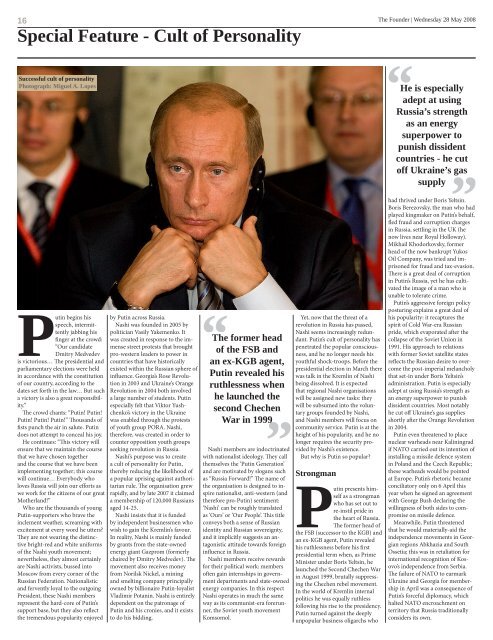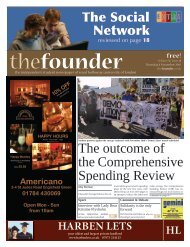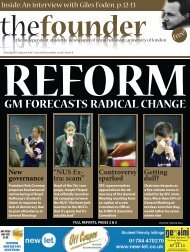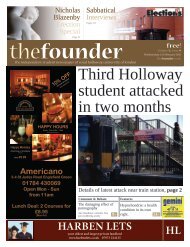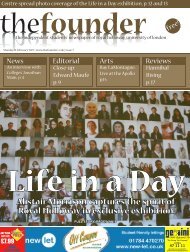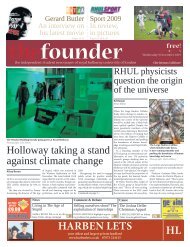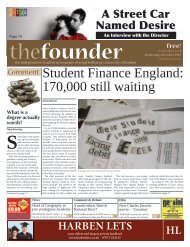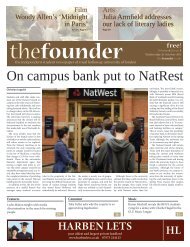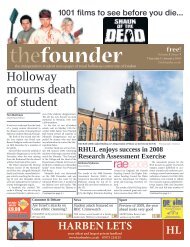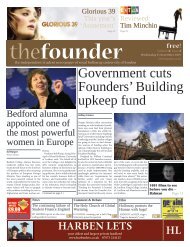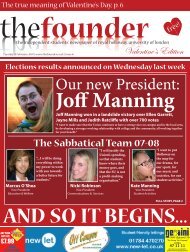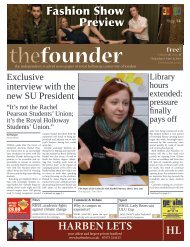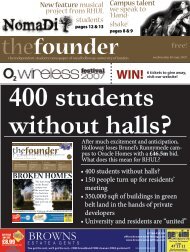Students unimpressed as Union announces Summer ... - The Founder
Students unimpressed as Union announces Summer ... - The Founder
Students unimpressed as Union announces Summer ... - The Founder
Create successful ePaper yourself
Turn your PDF publications into a flip-book with our unique Google optimized e-Paper software.
16 <strong>The</strong> <strong>Founder</strong> | Wednesday 28 May 2008<br />
Special Feature - Cult of Personality<br />
Successful cult of personality<br />
Photograph: Miguel A. Lopes<br />
Putin begins his<br />
speech, intermittently<br />
jabbing his<br />
finger at the crowd:<br />
“Our candidate<br />
Dmitry Medvedev<br />
is victorious… <strong>The</strong> presidential and<br />
parliamentary elections were held<br />
in accordance with the constitution<br />
of our country, according to the<br />
dates set forth in the law… But such<br />
a victory is also a great responsibility.”<br />
<strong>The</strong> crowd chants: “Putin! Putin!<br />
Putin! Putin! Putin!” Thousands of<br />
fists punch the air in salute. Putin<br />
does not attempt to conceal his joy.<br />
He continues: “This victory will<br />
ensure that we maintain the course<br />
that we have chosen together<br />
and the course that we have been<br />
implementing together; this course<br />
will continue… Everybody who<br />
loves Russia will join our efforts <strong>as</strong><br />
we work for the citizens of our great<br />
Motherland!”<br />
Who are the thousands of young<br />
Putin-supporters who brave the<br />
inclement weather, screaming with<br />
excitement at every word he utters?<br />
<strong>The</strong>y are not wearing the distinctive<br />
bright-red and white uniforms<br />
of the N<strong>as</strong>hi youth movement;<br />
nevertheless, they almost certainly<br />
are N<strong>as</strong>hi activists, bussed into<br />
Moscow from every corner of the<br />
Russian Federation. Nationalistic<br />
and fervently loyal to the outgoing<br />
President, these N<strong>as</strong>hi members<br />
represent the hard-core of Putin’s<br />
support b<strong>as</strong>e, but they also reflect<br />
the tremendous popularity enjoyed<br />
by Putin across Russia.<br />
N<strong>as</strong>hi w<strong>as</strong> founded in 2005 by<br />
politician V<strong>as</strong>ily Yakemenko. It<br />
w<strong>as</strong> created in response to the immense<br />
street protests that brought<br />
pro-western leaders to power in<br />
countries that have historically<br />
existed within the Russian sphere of<br />
influence. Georgia’s Rose Revolution<br />
in 2003 and Ukraine’s Orange<br />
Revolution in 2004 both involved<br />
a large number of students. Putin<br />
especially felt that Viktor Yushchenko’s<br />
victory in the Ukraine<br />
w<strong>as</strong> enabled through the protests<br />
of youth group PORA. N<strong>as</strong>hi,<br />
therefore, w<strong>as</strong> created in order to<br />
counter opposition youth groups<br />
seeking revolution in Russia.<br />
N<strong>as</strong>hi’s purpose w<strong>as</strong> to create<br />
a cult of personality for Putin,<br />
thereby reducing the likelihood of<br />
a popular uprising against authoritarian<br />
rule. <strong>The</strong> organisation grew<br />
rapidly, and by late 2007 it claimed<br />
a membership of 120,000 Russians<br />
aged 14-25.<br />
N<strong>as</strong>hi insists that it is funded<br />
by independent businessmen who<br />
wish to gain the Kremlin’s favour.<br />
In reality, N<strong>as</strong>hi is mainly funded<br />
by grants from the state-owned<br />
energy giant Gazprom (formerly<br />
chaired by Dmitry Medvedev). <strong>The</strong><br />
movement also receives money<br />
from Norilsk Nickel, a mining<br />
and smelting company principally<br />
owned by billionaire Putin-loyalist<br />
Vladimir Potanin. N<strong>as</strong>hi is entirely<br />
dependent on the patronage of<br />
Putin and his cronies, and it exists<br />
to do his bidding.<br />
“<br />
<strong>The</strong> former head<br />
of the FSB and<br />
an ex-KGB agent,<br />
Putin revealed his<br />
ruthlessness when<br />
he launched the<br />
second Chechen<br />
War in 1999<br />
”<br />
N<strong>as</strong>hi members are indoctrinated<br />
with nationalist ideology. <strong>The</strong>y call<br />
themselves the ‘Putin Generation’<br />
and are motivated by slogans such<br />
<strong>as</strong> “Russia Forward!” <strong>The</strong> name of<br />
the organisation is designed to inspire<br />
nationalist, anti-western (and<br />
therefore pro-Putin) sentiment:<br />
‘N<strong>as</strong>hi’ can be roughly translated<br />
<strong>as</strong> ‘Ours’ or ‘Our People’. This title<br />
conveys both a sense of Russian<br />
identity and Russian sovereignty,<br />
and it implicitly suggests an antagonistic<br />
attitude towards foreign<br />
influence in Russia.<br />
N<strong>as</strong>hi members receive rewards<br />
for their political work: members<br />
often gain internships in government<br />
departments and state-owned<br />
energy companies. In this respect<br />
N<strong>as</strong>hi operates in much the same<br />
way <strong>as</strong> its communist-era forerunner,<br />
the Soviet youth movement<br />
Komsomol.<br />
Yet, now that the threat of a<br />
revolution in Russia h<strong>as</strong> p<strong>as</strong>sed,<br />
N<strong>as</strong>hi seems incre<strong>as</strong>ingly redundant.<br />
Putin’s cult of personality h<strong>as</strong><br />
penetrated the popular consciousness,<br />
and he no longer needs his<br />
youthful shock-troops. Before the<br />
presidential election in March there<br />
w<strong>as</strong> talk in the Kremlin of N<strong>as</strong>hi<br />
being dissolved. It is expected<br />
that regional N<strong>as</strong>hi organisations<br />
will be <strong>as</strong>signed new t<strong>as</strong>ks: they<br />
will be subsumed into the voluntary<br />
groups founded by N<strong>as</strong>hi,<br />
and N<strong>as</strong>hi members will focus on<br />
community service. Putin is at the<br />
height of his popularity, and he no<br />
longer requires the security provided<br />
by N<strong>as</strong>hi’s existence.<br />
But why is Putin so popular?<br />
Strongman<br />
Putin presents himself<br />
<strong>as</strong> a strongman<br />
who h<strong>as</strong> set out to<br />
re-instil pride in<br />
the heart of Russia.<br />
<strong>The</strong> former head of<br />
the FSB (successor to the KGB) and<br />
an ex-KGB agent, Putin revealed<br />
his ruthlessness before his first<br />
presidential term when, <strong>as</strong> Prime<br />
Minister under Boris Yeltsin, he<br />
launched the Second Chechen War<br />
in August 1999, brutally suppressing<br />
the Chechen rebel movement.<br />
In the world of Kremlin internal<br />
politics he w<strong>as</strong> equally ruthless<br />
following his rise to the presidency.<br />
Putin turned against the deeply<br />
unpopular business oligarchs who<br />
“<br />
He is especially<br />
adept at using<br />
Russia’s strength<br />
<strong>as</strong> an energy<br />
superpower to<br />
punish dissident<br />
countries - he cut<br />
off Ukraine’s g<strong>as</strong><br />
supply<br />
”<br />
had thrived under Boris Yeltsin.<br />
Boris Berezovsky, the man who had<br />
played kingmaker on Putin’s behalf,<br />
fled fraud and corruption charges<br />
in Russia, settling in the UK (he<br />
now lives near Royal Holloway).<br />
Mikhail Khodorkovsky, former<br />
head of the now bankrupt Yukos<br />
Oil Company, w<strong>as</strong> tried and imprisoned<br />
for fraud and tax-ev<strong>as</strong>ion.<br />
<strong>The</strong>re is a great deal of corruption<br />
in Putin’s Russia, yet he h<strong>as</strong> cultivated<br />
the image of a man who is<br />
unable to tolerate crime.<br />
Putin’s aggressive foreign policy<br />
posturing explains a great deal of<br />
his popularity: it recaptures the<br />
spirit of Cold War-era Russian<br />
pride, which evaporated after the<br />
collapse of the Soviet <strong>Union</strong> in<br />
1991. His approach to relations<br />
with former Soviet satellite states<br />
reflects the Russian desire to overcome<br />
the post-imperial melancholy<br />
that set-in under Boris Yeltsin’s<br />
administration. Putin is especially<br />
adept at using Russia’s strength <strong>as</strong><br />
an energy superpower to punish<br />
dissident countries. Most notably<br />
he cut off Ukraine’s g<strong>as</strong> supplies<br />
shortly after the Orange Revolution<br />
in 2004.<br />
Putin even threatened to place<br />
nuclear warheads near Kaliningrad<br />
if NATO carried out its intention of<br />
installing a missile defence system<br />
in Poland and the Czech Republic;<br />
these warheads would be pointed<br />
at Europe. Putin’s rhetoric became<br />
conciliatory only on 6 April this<br />
year when he signed an agreement<br />
with George Bush declaring the<br />
willingness of both sides to compromise<br />
on missile defence.<br />
Meanwhile, Putin threatened<br />
that he would materially-aid the<br />
independence movements in Georgian<br />
regions Abkhazia and South<br />
Ossetia; this w<strong>as</strong> in retaliation for<br />
international recognition of Kosovo’s<br />
independence from Serbia.<br />
<strong>The</strong> failure of NATO to earmark<br />
Ukraine and Georgia for membership<br />
in April w<strong>as</strong> a consequence of<br />
Putin’s forceful diplomacy, which<br />
halted NATO encroachment on<br />
territory that Russia traditionally<br />
considers its own.


